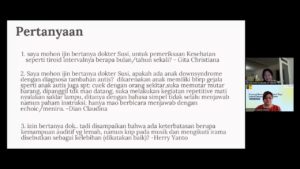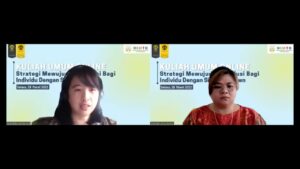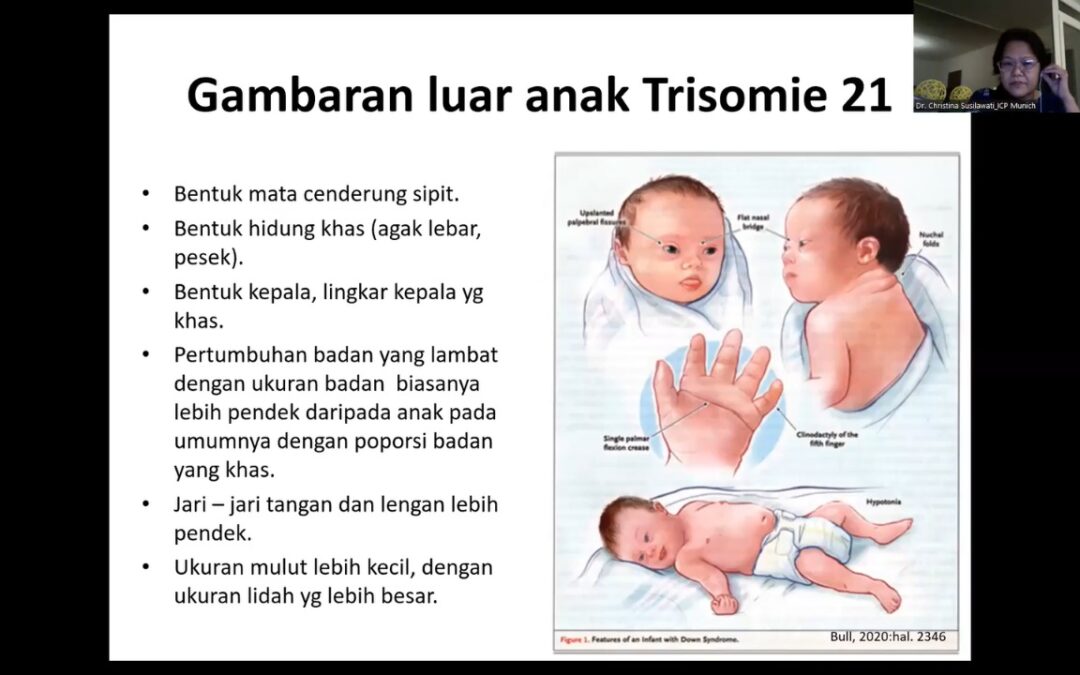Depok-Occupational Therapy Study Program, Vocational Education Program of Universitas Indonesia (UI) together with the Occupational Therapy Alumni Association (ILUNI) and the Occupational Therapy Student Association held a public lecture entitled “Strategies for Creating Inclusion for Individuals with Down Syndrome” on March 29, 2022. This public lecture was held to commemorate Down Syndrome Month by presenting Dr. dr. Christina Susilawati, Doctor and Researcher on Developmental Problems in Munich, Germany; Felicia Shan Sugata, S.T., M.M., Founder of @downsyndome.id and a parent with down syndrome children as a speaker and guided by Vonny Susanti, A.Md. OT., M.Psi., Chairman of DPD IOTI DKI Jakarta who is also an alumni of UI Occupational Therapy.
Genetic chromosome 21 disorder (Trisomy 21) or commonly known as Down syndrome is a genetic disorder condition that is caused when cell division in humans produces additional genetic material from chromosome 21. Children who have down syndrome have several physical features, namely the shape of the eyes that tend to be slanted, a distinctive nose shape (rather wide or snub), slow body growth with body size usually shorter than children in general, shorter fingers and arms, and a smaller mouth with a larger tongue.
Susi explained that children with down syndrome tend to have vulnerable health risks. “Diseases that happened, such as congenital heart disease, digestive system disorders, decreased thyroid gland function, decreased resistance to infection, high risk of leukemia, hearing loss, visual impairment, muscle weakness, epilepsy, stunted tooth growth, and diabetes can occur. to children who have Down syndrome,” explained Susi.
 (Photo: Q&A session between dr. Susi and the participants of the webinar)
(Photo: Q&A session between dr. Susi and the participants of the webinar)
She also said that the examination of children with down syndrome is highly recommended and carried out regularly so that it can be detected as early as possible. Also, an orthopedic examination also needs to be carried out, especially on weakness of the muscle structure in the neck and spine.
“Full support is needed from the family, both support through therapy, early medical treatment, inclusive education, also full acceptance within the family sphere which also has an impact on the mentality of the child,” added Susi.
On the same occasion, Felicia Shan Sugat, shared her experience about her child’s growth and development. Felicia said that her son—Bodhi—was expected to be born with down syndrome. “After my son was expected to be born with trisomy 21, I tried to find information about down syndrome and what to do as a parent. In fact, even after birth my child also suffered from congenital heart problems, so surgery was needed right away,” said Felicia.
The main thing of concern to her was Bodhi’s medical condition. In addition, full support, both from partners, parents, and family, is very large and helps her to accept the conditions experienced by the child.
 (Photo: Felicia shares her experience as a parent with a down syndrome child)
(Photo: Felicia shares her experience as a parent with a down syndrome child)
Felicia said, “The stigma from the environment outside the family is what I encounter more often. That is what I experienced myself, also what was experienced by friends in the community of parents with down syndrome children.”
Until now, Indonesia does not have a special health care center for down syndrome. Felicia hopes that in the future special facilities and medical personnel can be provided to assist parents with other down syndrome children so that they can continue to help monitor the growth and development of their children.


